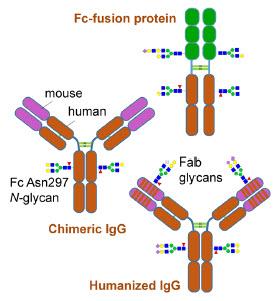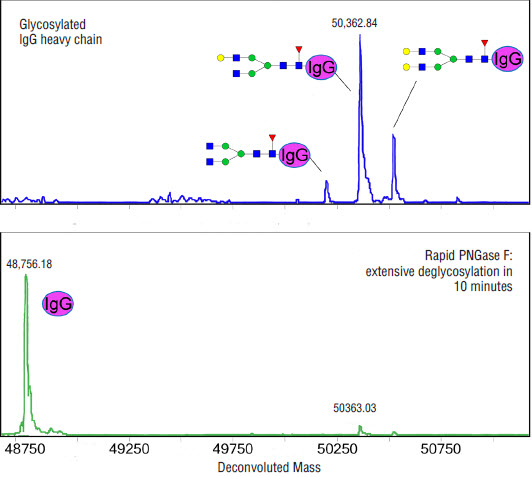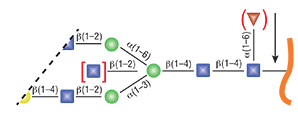Rapid™ PNGase F
Product information| Code | Name | Size | Quantity | Price | |
|---|---|---|---|---|---|
P0710S |
Rapid PNGase F |
50 rxn | - | Unavailable in your region |
Rapid™ PNGase F
Product Introduction
Deglycosylation in minutes for N-glycan analysis
Rapid PNGase F enables complete and rapid deglycosylation of antibodies and immunoglobulin fusion proteins, as well as other glycoproteins, in minutes. All N-glycans are released rapidly and without bias, and are ready to be prepared for downstream chromatography or mass spectrometry analysis. Rapid PNGase F creates an optimized workflow, reducing processing time without compromising sensitivity or reproducibility.
- Complete deglycosylation of antibodies and immunoglobulin fusion proteins in 10 minutes
- Recombinant enzyme; guaranteed endoglycosidase F1, F2 or F3 free
- All reaction components are compatible with HPLC and mass spectrometry analysis
- ≥ 95% purity, as determined by SDS-PAGE and intact ESI-MS
- Optimal activity and stability ensured for up to 24 months
- Fast reaction setup
| Catalog # | Size | Concentration |
|---|---|---|
| P0710S | 50 reactions |
Featured Videos
View Video Library- Product Information
- Protocols, Manuals & Usage
- Tools & Resources
- FAQs & Troubleshooting
- Citations & Technical Literature
- Quality, Safety & Legal
- Other Products You May Be Interested In
Product Information
Description
A growing number of antibodies and antibody fusions are currently used as therapeutic agents. A conserved N-glycan at Asn297 of the Fc region of IgG is critical for functional activity. Moreover, some antibodies have additional N-glycans that, together with the conserved site, affect recognition, half-life, and immune reactions.Antibody glycosylation is heterogeneous, and variables in cell culture can increase glycan diversity. Monitoring glycosylation during production is essential to obtain the correct glycoprotein forms.
PNGase F is the most effective enzymatic method for removing almost all N-linked oligosaccharides from glycoproteins. PNGase F digestion deaminates the aspargine residue to aspartic acid, and leaves the oligosaccharide intact, keeping it suitable for further analysis.
Obtaining an accurate N-glycan profile in the shortest time possible is essential for effective process control. Typically, enzymatic release of antibody N-glycans using PNGase F requires an incubation time of several hours, followed by glycan derivatization and analysis by liquid chromatography and/ or mass spectrometry. In addition, incomplete deglycosylation can lead to biased results. Some glycans are easier to remove than others and unless deglycosylation is extensive, the profile obtained will not represent the correct composition of the therapeutic antibody.
Rapid PNGase F is an improved recombinant reagent that allows the complete and rapid deglycosylation of antibodies and fusion proteins in minutes. All N-glycans are released rapidly and without bias, and are ready to be prepared for downstream chromatography or mass spectrometry analysis. Rapid PNGase F creates an optimized workflow which reduces processing time without compromising sensitivity or reproducibility.


Specificity
Rapid PNGase F cleaves all complex, hybrid and high-mannose type glycans from antibodies and related proteins (1). Core α1-3 fucosylation (found in immunoglobulins expressed in plant or insect cells) is resistant to both PNGase F and Rapid PNGase F.
- This product is related to the following categories:
- Endoglycosidases,
- Proteome Analysis,
- This product can be used in the following applications:
- Expression Systems,
- Glycan Sequencing,
- Recombinant Glycoprotein Expression, Glycoprotein Analysis
Reagents Supplied
Reagents Supplied
The following reagents are supplied with this product:
| NEB # | Component Name | Component # | Stored at (°C) | Amount | Concentration | |
|---|---|---|---|---|---|---|
Properties & Usage
Reaction Conditions
1X Rapid PNGase F Buffer
Incubate at 50°C
Heat Inactivation
75°C for 10 minutesApplication Features
Rapid PNGase F is an improved recombinant reagent that allows the complete and rapid deglycosylation of antibodies and fusion proteins in only minutes. All N-glycans are released rapidly and without bias, ready to be prepared for downstream chromatography or mass spectrometry analysis.A variety of therapeutic monoclonal antibodies were used to validate Rapid PNGase F: different subclasses (IgG 1 to 4), isotypes (IgA, IgM, IgE), organisms (mouse, human, and humanized), sources (CHO, murine myeloma), and structures (IgG, IgG-fusions).
Rapid PNGase F can effectively remove all N-glycans from both conserved (i.e. Fc Asn297) and non-conserved (i.e. Fab N-glycans) glycosylation sites. Validation was in accordance with published data. Sensitivity and specificity are not compromised by a faster and more convenient glycoprotein characterization workflow using Rapid PNGase F.
Related Products
Companion Products
Product Notes
- Storage: It is recommended to store this kit at -20°C.All components will be stable for at least two years if stored correctly.
References
- Maley, F. et al. (1989). Anal. Biochem. 180, 195-204.
Protocols, Manuals & Usage
Protocols
Application Notes
- AppNote_Unbiased_and_Fast_IgG_Deglycosylation _for_Accurate_N-glycan_Analysis_using_Rapid_PNGase_F
- AppNote_Glycan_Analysis_of_Murine_IgG2a_by_Enzymatic_Digestion_with_PNGase_F_and_Trypsin
- AppNote_Proteomics_Fast_and_Efficient_Antibody_Deglycosylation_using_Rapid_PNGase_F
- Glycan Analysis of Murine IgG2a by Enzymatic Digestion with PNGase F and Trypsin, Followed by Mass Spectrometric Analysis
- Using Glycosidases to Remove, Trim, or Modify Glycans on Therapeutic Proteins
- Detailed Characterization of Antibody Glycan Structure using the N-Glycan Sequencing Kit
Tools & Resources
Selection Charts
FAQs & Troubleshooting
FAQs
- What is the difference between Rapid PNGase F and Endo S (Endo S, NEB# P0741)?
- What is the difference between Rapid PNGase F and PNGase F?
- What are the components of Rapid PNGase F?
- What are the typical reaction conditions for Rapid PNGase F?
- How do I know whether to follow the “One Step” or the “Two Step” protocol?
- How much Rapid PNGase F should I use to deglycosylate my antibody sample?
- What buffers or additives should be avoided when using Rapid PNGase F?
- How can I test whether the Rapid PNGase F reaction is complete in 10 minutes?
- Are downstream analysis such as HPLC and Mass Spectrometry compatible with Rapid PNGase F?
- Is Rapid PNGase F only suitable for deglycosylation of antibodies?
- Are longer incubation times detrimental to the Rapid PNGase F reaction?
- What is the reaction temperature range for Rapid PNGase F?
- What happens to the asparagine residue after Rapid PNGase F removes the sugar?
- Will a Rapid PNGase F reaction preserve the integrity of glycosylamines?
- Can a protease inhibitor cocktail be used in a Rapid PNGase F reaction?
- What is a good control substrate for Rapid PNGase F?
Tech Tips
- Before using the Rapid PNGase F, make sure all components are in solution.
- Before incubation, make sure the Rapid Buffer, IgG, and rapid PNGase F are properly mixed.
- If needed, reaction volumes can be scaled up or down, adjusting the amount of Rapid PNGase F accordingly. Altering the components ratio will lead to suboptimal results (for instance, using a larger reaction volume with only 1ul of enzyme).
- For high throughput applications reactions can be prepared at room temperature. The deglycosylation reaction will begin once the temperature is raised to 50ºC.
- Typically, the reaction is completed after 3-5 minutes at 50ºC. Incubation longer than 15 minutes will not result in further deglycosylation. If the reaction is still incomplete, try a 2 step protocol (pre-denaturation at 80C).
- If inactivation of Rapid PGNase F is required after deglycosylation, heat for 20 minutes at 70C. Higher temperatures might result in coagulation of target antibody.
- Avoid buffers containing SDS, as it inhibits PNGase F. Common stabilizing reagents such as Tween, Triton X-100, NP-40, octyl glucoside and non-detergent sulfobetaine, as well as traces of organic solvents, can prevent optimal rapid deglycosyl¬ation.
Citations & Technical Literature
Citations
Additional Citations
Feature Articles
Quality, Safety & Legal
Quality Assurance Statement
Quality Control tests are performed on each new lot of NEB product to meet the specifications designated for it. Specifications and individual lot data from the tests that are performed for this particular product can be found and downloaded on the Product Specification Sheet, Certificate of Analysis, data card or product manual. Further information regarding NEB product quality can be found here.Specification Change Notifications
Effective May 12, 2025:
- The shelf life of Rapid™ PNGase F is being extended from 12 months to 24 months.
- The storage temperature of Rapid™ PNGase F and associated components is changing from 4°C to -20°C.
- Two assays are being removed from the specification, Glycosidase Activity (Endo F2, F3) and Glycosidase Activity (Endo F1, F2, H) as Recombinant PNGase F enzymes are specifically engineered to be endoglycosidase F1-, F2-and F3-free, therefore these assays are not applicable.
Specifications
The Specification sheet is a document that includes the storage temperature, shelf life and the specifications designated for the product. The following file naming structure is used to name these document files: [Product Number]_[Size]_[Version]Certificate Of Analysis
The Certificate of Analysis (COA) is a signed document that includes the storage temperature, expiration date and quality controls for an individual lot. The following file naming structure is used to name these document files: [Product Number]_[Size]_[Version]_[Lot Number]- P0710S_v1_0021603
- P0710S_v1_0021609
- P0710S_v1_0021702
- P0710S_v1_0021706
- P0710S_v1_0021711
- P0710S_v2_0021802
- P0710S_v2_10007354
- P0710S_v2_10013511
- P0710S_v2_10018433
- P0710S_v2_10027186
- P0710S_v2_10031447
- P0710S_v2_10049216
- P0710S_v2_10053297
- P0710S_v2_10059645
- P0710S_v2_10065562
- P0710S_v2_10072130
- P0710S_v2_10075177
- P0710S_v2_10079162
- P0710S_v2_10081869
- P0710S_v2_10089227
- P0710S_v2_10099883
- P0710S_v2_10104502
- P0710S_v2_10111477
- P0710S_v2_10121399
- P0710S_v2_10136932
- P0710S_v2_10142233
- P0710S_v2_10149045
- P0710S_v2_10155102
- P0710S_v2_10162235
- P0710S_v2_10171518
- P0710S_v2_10182190
- P0710S_v2_10190559
- P0710S_v2_10206195
- P0710S_v2_10217669
- P0710S_v2_10231305
- P0710S_v2_10235400
- P0710S_v2_10243676
- P0710S_v2_10251774
- P0710S_v2_10256729
- P0710S_v2_10270960
- P0710S_v3_10287591
- P0710S_v3_10289380
- P0710S_v3_10299279
- P0710S_v3_10307111
Safety DataSheets
The following is a list of Safety Data Sheet (SDS) that apply to this product to help you use it safely.Rapid™ PNGase F
Rapid PNGase F Buffer
Legal and Disclaimers
Products and content are covered by one or more patents, trademarks and/or copyrights owned or controlled by New England Biolabs, Inc (NEB). The use of trademark symbols does not necessarily indicate that the name is trademarked in the country where it is being read; it indicates where the content was originally developed. The use of this product may require the buyer to obtain additional third-party intellectual property rights for certain applications. For more information, please email busdev@neb.com.This product is intended for research purposes only. This product is not intended to be used for therapeutic or diagnostic purposes in humans or animals.
New England Biolabs (NEB) is committed to practicing ethical science – we believe it is our job as researchers to ask the important questions that when answered will help preserve our quality of life and the world that we live in. However, this research should always be done in safe and ethical manner. Learn more.
Other Products You May Be Interested In
The supporting documents available for this product can be downloaded below.
Protocol
Rapid PNGase F Protocols (P0710)
Protocol
Rapid PNGase F Protocols (P0710)
Protocol
Rapid PNGase F Protocols (P0710)
Protocol
Rapid PNGase F Protocols (P0710)









